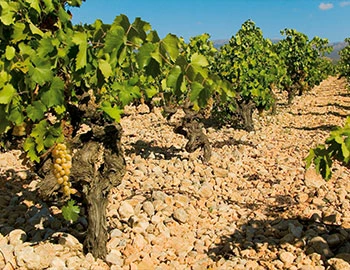Sió negre 2021
VdT, Ribas, 6000 ml
| Grape variety: | Mantonegro, Syrah, Gargollassa |
| Producer: | Bodegas Ribas |
| Origin: | Spain / Mallorca |
| Other bottle sizes: | |
| Other vintages: |
Description
Concepció, or Sió for short, was the grandmother of the current generation at Bodega Ribas. She handed over the estate to her daughters in the 1980s and unwaveringly supported them in switching to making their own wines. This wine is a tribute to her - and it is therefore no coincidence that it shows so much backbone. Dark fruit, sandalwood, cinnamon, coconut and a delicate floral note on the nose, lots of freshness on the palate, paired with noticeable grip, powerful and with a Mediterranean character. The best friend for barbecues: with its spiciness, it almost calls out for grilled meat with vegetables!
Attributes
| Origin: | Spain / Mallorca |
| Grape variety: | Mantonegro, Syrah, Gargollassa |
| Label: | Vegan, Certified organic or biodynamic wine |
| Ripening potential: | 2 to 8 years |
| Drinking temperature: | 16 to 18 °C |
| Food Pairing: | Bistecca fiorentina, T-Bone steak, Spicy hard cheese, Saddle of lamb fillet with herb jus, Wild fowl, Cold fish dish, dried meat, Roast saddle of venison |
| Vinification: | fermentation in steel tank, fermentation at low temperatures, long must fermentation, protein fining |
| Harvest: | hand-picking, strict selection, in small boxes, selecting the grapes (by hand) |
| Maturation: | in partly new and used barriques/ Pièces |
| Bottling: | no filtration |
| Maturation duration: | 12 months |
| Volume: | 14.5 % |
| Note: | Contains sulphites |
Bodegas Ribas
We could talk about our winery of the year, Bodega Ribas on Mallorca, all day long. But it's best to see and read for yourself! We sent wine journalist Britta Wiegelmann and cameraman Felix Groteloh to experience the winery and the family at first hand. Araceli and Javier Servera Ribas, the brother and sister team behind the wines, tell us how the oldest existing winery on the island survived phylloxera, why they love their local grape, the Mantonegro, so much and what the sea has to do with it all.
For 300 years, the Ribas winery in Consell, a village of 4000 people just a stone's throw from Palma, has been cultivating a real treasure: ancient indigenous grape varieties such as Mantonegro, Gargollassa, Callet, Prensal blanc and the rare Giró Ros. These grapes can only be found here – and who could offer them a better home than the oldest bodega still in existence on the island? Pedro Ribas planted the first vines in 1711, and today the vineyards cover 40 hectares at around 150 metres above sea level with sandy and calcareous, sometimes very stony soils that are cultivated organically.
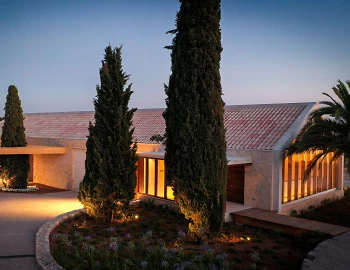
Mantonegro
The prince of Mallorca
The word “negro” – black – in this variety’s name is misleading. It refers to a red wine grape, and a relatively light one at that. Some grapes even shimmer more pink than red. The Manto negro is the most important variety, and a real native, of the holiday island of Mallorca. It yields bright-red, soft wines with plenty of alcohol and an unusual bouquet of blackberry, fig and pomegranate. A small amount of Callet – a slightly stronger Mallorcan variety – is usually added to lend it structure. Wines from Manto negro are well suited for barrel maturation, especially if they come from old vines. These provide particularly concentrated musts that are full of character.
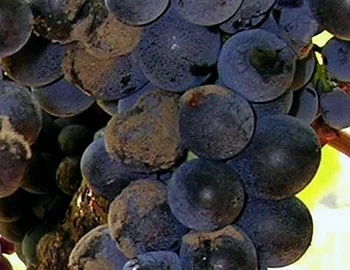
Syrah
A hint of pepper
The legend stubbornly persists that the Syrah variety came from the Persian city of Shiraz. Yet, researchers have shown that it is a natural crossing of two old French varieties: the red Dureza from the Rhône Valley and the white Mondeuse blanche from Savoy. Wines from Syrah are gentle and concentrated. They smell of dark berries, violets and liquorice, and amaze with a piquant touch of white pepper. As varietal wines, they are found on the northern Rhone, as in the Hermitage or Côte Rôtie appellations, as well as in Swiss Valais. In the southern Rhône Valley, Syrah is often wedded with Grenache and Mourvèdre. In 1832, a Frenchman brought the variety to Australia, where it became the emblem of the national wine industry. There, the weightiest versions develop with typical notes of tar and chocolate.
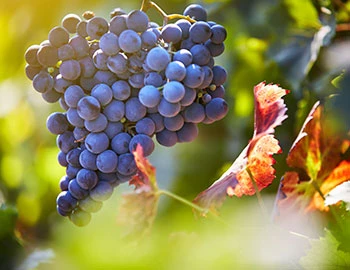
Mallorca
Mallorca: new premium wines from old varieties
The party island is showing an entirely different, more delightful side: every year, more premium wines are produced in Mallorca. While international varieties like Chardonnay, Cabernet Sauvignon and Merlot yield excellent wines in Mallorca’s terroir, top winemakers increasingly use the best native varieties, such as Manto Negro, Callet and Prensal Blanc. The results are independent wines with Mediterranean charm and surprising freshness.
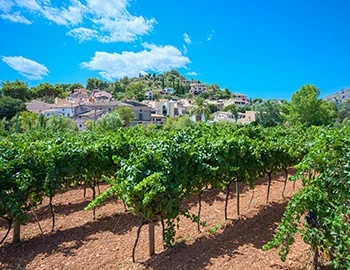
Spain
Spain – Variety and perfection
“Somewhere in la Mancha, in a place whose name I do not care to remember...,” begins Don Quixote's odyssey.
The most famous part is definitely when Don Quixote thinks windmills are his enemy and wants to fight them – until they nearly kill him. It’s possible there was a bit too much of the La Mancha wine at play. Spanish vines fight for their survival in rugged landscapes, battling fierce drought and rough soils. But they fight well.
